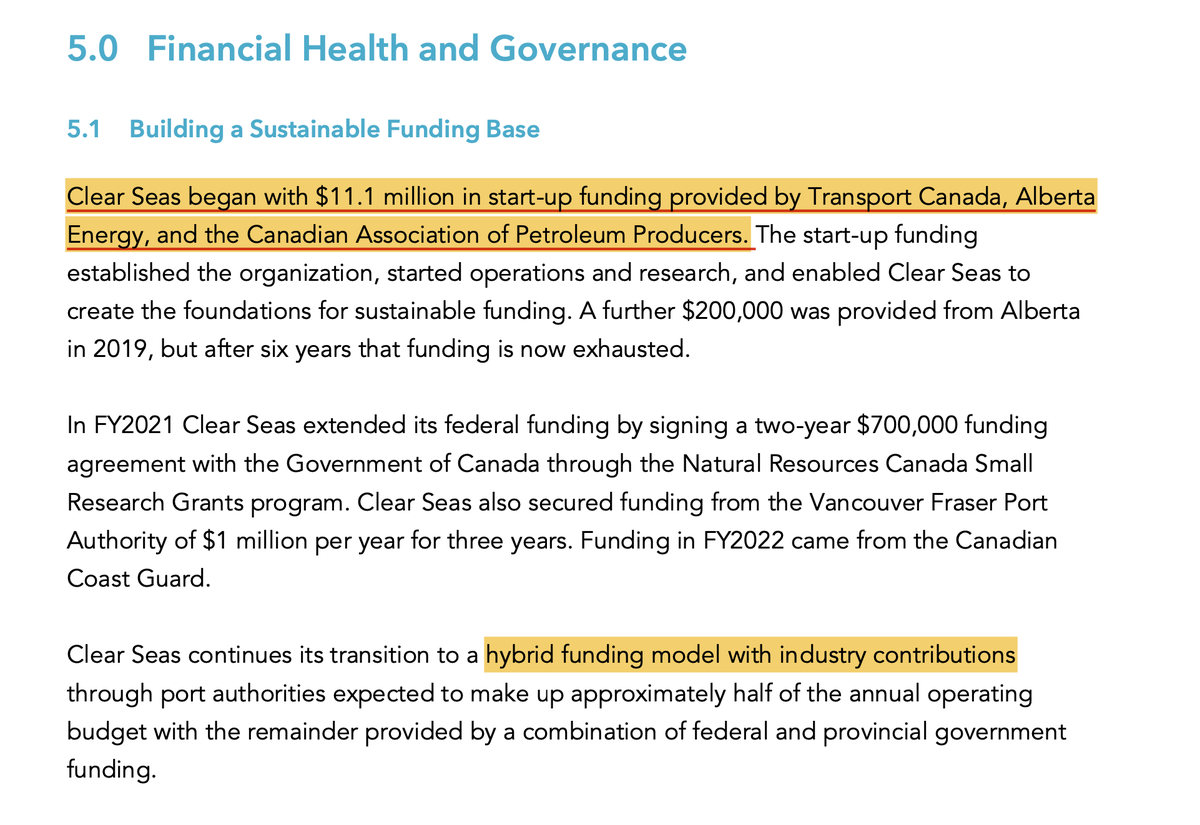
Fossil fuel funded “NGO” @ClearSeasOrg released a dangerous report this month implying scrubbers are safe for our waters.
It’s the most sophisticated greenwashing I’ve seen in a while. Let’s debunk it. 🧵
@Transport_gc #BanScrubbers #OceanPollution #cruiseship
It’s the most sophisticated greenwashing I’ve seen in a while. Let’s debunk it. 🧵
@Transport_gc #BanScrubbers #OceanPollution #cruiseship
First of all, Clear Seas is funded by Alberta Energy and the Canadian Association of Petroleum Producers (CAPP), & other industry. They have a vested interest in the shipping industry’s use of high-sulphur fuel oils and scrubbers. /2 

This is not a report. It’s shareholder talking points sprinkled with cherry picked facts. /3
Clear Seas uses data dismissed by the @IMOHQ.
This data makes it seem like scrubber water is ok and that any existing contaminants were already in the water. /4
This data makes it seem like scrubber water is ok and that any existing contaminants were already in the water. /4
But our waters are so heavily contaminated BECAUSE of the pollution we’re dumping into the water. Say, by dumping massive volumes of acidic, toxic-laden thermal pollution (aka scrubber washwater) into our oceans. It’s a circular argument! /5
Clear Seas wants us to believe scrubbers are okay because they’re the cheapest fix for sulfur air pollution.
Scrubbers allow big ships to keep costs low by dumping that pollution into the ocean, where it is under-regulated./6
Scrubbers allow big ships to keep costs low by dumping that pollution into the ocean, where it is under-regulated./6

They want you to think that these metals are “naturally occurring” and industry shouldn’t be responsible for the clean up.
Even as, PAGES LATER, they admit the sea inlets have high levels of PAHs because the toxins in scrubber waste bind to marine sediments. /7
Even as, PAGES LATER, they admit the sea inlets have high levels of PAHs because the toxins in scrubber waste bind to marine sediments. /7

Meanwhile, they themselves admit that the data is FLAWED and INCONCLUSIVE.
It doesn't include three important factors for pollution: engine load, speed, & flow rates.
There’s no baseline for comparison. /8
It doesn't include three important factors for pollution: engine load, speed, & flow rates.
There’s no baseline for comparison. /8

Then, despite these huge data gaps, and despite the fact that wastewater is toxic and laden with heavy metals, it goes on to make a series of watered down recommendations that amount to very little and let industry keep doing what they’re doing, uninterrupted & unregulated. /9
Even though, their OWN albeit flawed analysis proves they shouldn’t.
Their graph on ocean acidification actually demonstrates how open-loop scrubber systems acidify the ocean below IMO pH guidelines.
(Anything below the yellow line is dangerous) /10
Their graph on ocean acidification actually demonstrates how open-loop scrubber systems acidify the ocean below IMO pH guidelines.
(Anything below the yellow line is dangerous) /10

If this seems confusing, it’s because it’s designed to.
Clear Seas seems to be banking on us not checking their data or methodology so that they can freely lobby govs into letting the shipping industry use heavy oils and scrubbers. /11
Clear Seas seems to be banking on us not checking their data or methodology so that they can freely lobby govs into letting the shipping industry use heavy oils and scrubbers. /11
The truth is scrubber systems are optional. California has simply required cleaner fuels. Canada has the longest coastline of any nation state in the world, and we can do a better job of protecting it.
Take Action: act.stand.earth/page/15809/act… . /12
Take Action: act.stand.earth/page/15809/act… . /12
• • •
Missing some Tweet in this thread? You can try to
force a refresh



